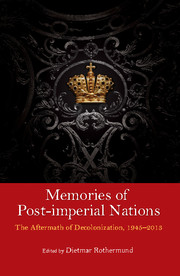Book contents
- Frontmatter
- Contents
- Preface
- Introduction
- 1 Memory of Empire in Britain: A Preliminary View
- 2 Ruptures and Dissonance: Post-colonial Migrations and the Remembrance of Colonialism in the Netherlands
- 3 A Distinctive Ugliness: Colonial Memory in Belgium
- 4 The Post-colonial Encounter in France
- 5 Ideologies of Exceptionality and the Legacies of Empire in Portugal
- 6 Post-colonial Italy: The Case of a Small and Belated Empire: From Strong Emotions to Bigger Problems
- 7 Post-imperial Japan in Transnational Perspective
- 8 Memories of Post-imperial Nations
- 9 A View from the Gallery: Perspective of a ‘Colonized’ on Post-imperial Memories
- Contributors
- Index
Introduction
Published online by Cambridge University Press: 05 September 2015
- Frontmatter
- Contents
- Preface
- Introduction
- 1 Memory of Empire in Britain: A Preliminary View
- 2 Ruptures and Dissonance: Post-colonial Migrations and the Remembrance of Colonialism in the Netherlands
- 3 A Distinctive Ugliness: Colonial Memory in Belgium
- 4 The Post-colonial Encounter in France
- 5 Ideologies of Exceptionality and the Legacies of Empire in Portugal
- 6 Post-colonial Italy: The Case of a Small and Belated Empire: From Strong Emotions to Bigger Problems
- 7 Post-imperial Japan in Transnational Perspective
- 8 Memories of Post-imperial Nations
- 9 A View from the Gallery: Perspective of a ‘Colonized’ on Post-imperial Memories
- Contributors
- Index
Summary
Memory and agency
Recent decades have witnesssed a veritable ‘memory boom’. Scholars who have commented on this boom have linked it to the ‘death of the future’ and to the ‘ideological exhaustion’ which occurred after the collapse of Communism at the end of the Cold War. Looking back seemed to be more promising than looking ahead. But there was also another reason for privileging memory and it is based on human agency which was highlighted at about the same time by social scientists who wanted to overcome deterministic theories of social evolution. However, emancipating the human agent from the fetters of determinism, which made him/her a mere puppet in the hands of a pre-ordained destiny begs the question of reconciling the aims of agents who were guided by their own intentions without taking heed of others. Therefore, the social scientists who speak of agency also speak of negotiation. This refers to a process of open deliberation, which presumes agency freedom. Agency and negotiation are thus interdependent. This would also be applicable to the field of collective memory. Maurice Halbwachs, a pioneer in this field, has stressed that this type of memory depends on social frameworks. Introducing the concepts of agency and negotiation one may say that the collective memory is the product of deliberations among many agents who can construct and deconstruct the contents of this memory. In this process, individual and collective memories interact. Elements of individual memories may enter the collective memory and this then may influence the ways in which individual memories are preserved and expressed.
There is, of course, an aspect of individual memory which is so to speak ‘not negotiable’. This does not refer to the ‘edited’ memory which will be discussed later on, but only to the moments of sudden recall, which then conjure up additional thoughts and feelings.
- Type
- Chapter
- Information
- Memories of Post-Imperial NationsThe Aftermath of Decolonization, 1945–2013, pp. 1 - 17Publisher: Cambridge University PressPrint publication year: 2015
- 1
- Cited by



